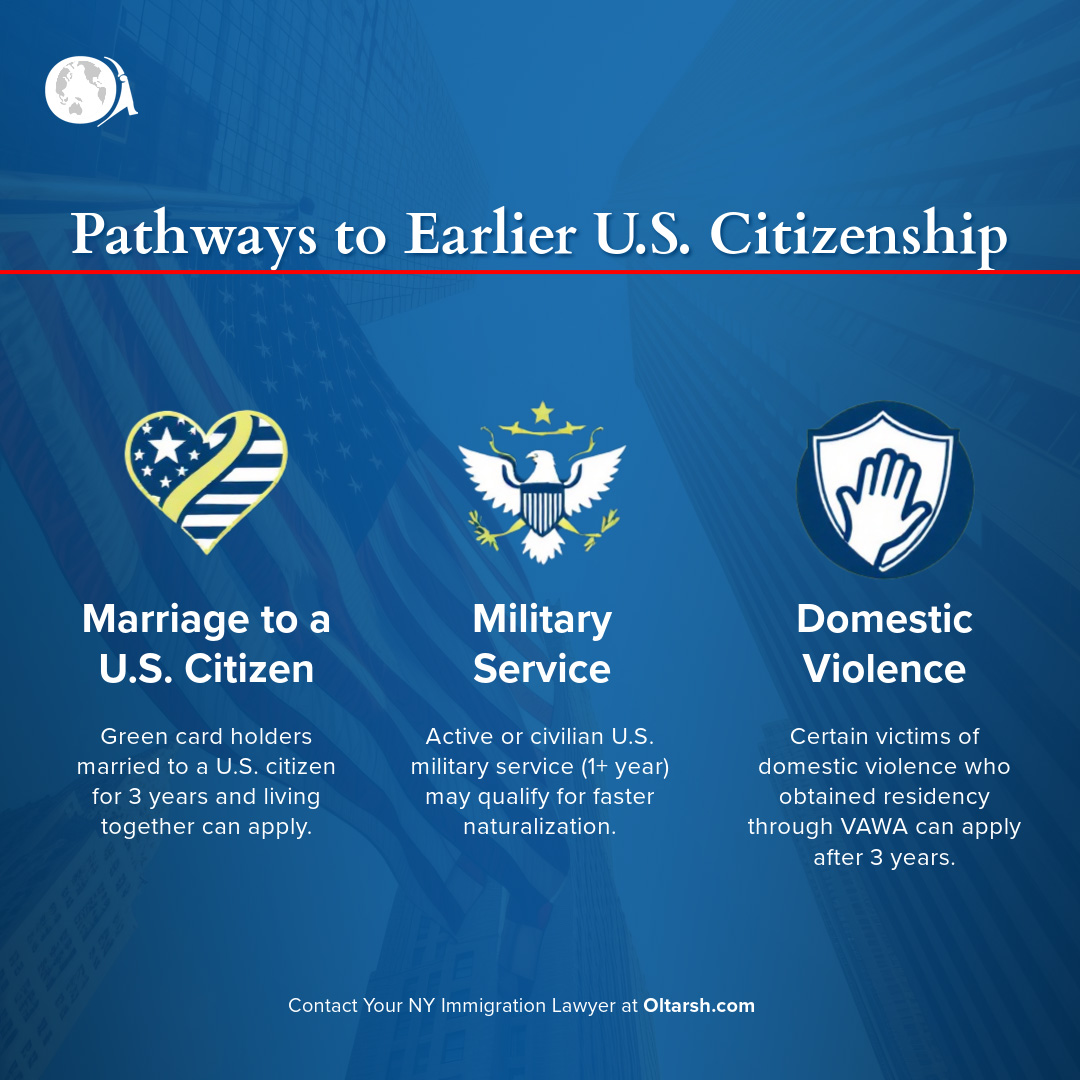
U.S. citizenship is a prestigious status that grants significant benefits, including the right to vote in federal elections, access to public benefits, and protection from deportation.
For green card holders, the naturalization process signifies a means to fully integrate into American society and be free from any possibility of not being able to remain in or return to the United States. Unlike lawful permanent residents, naturalized citizens enjoy freedom from travel restrictions and immunity from deportation, making citizenship a vital step toward security and participation in the democratic process. Citizenship also provides access to federal jobs reserved for U.S. citizens and eligibility for government benefits unavailable to non-citizens.
The journey to becoming a U.S. citizen involves meeting specific eligibility requirements, passing a civics test and English language test, and demonstrating good moral character.
Lawful permanent residents who have resided in the United States for at least five years are generally eligible to apply for U.S. citizenship. Green card holders married to a U.S. citizen may qualify for expedited naturalization after three years of marriage. Military members and spouses of qualified individuals overseas, such as spouses living with their military husband or wife, can qualify earlier.
Applicants can submit Form N-400 to the U.S. Citizenship and Immigration Services (USCIS) as early as 90 days before completing their three- or five-year residency period, provided they meet all other citizenship requirements and a resident of the state in which they currently reside for at least three months.
To apply for naturalization, a permanent resident must meet the following eligibility requirements:
Form N-400 is the primary naturalization application, and accuracy is critical to avoid delays or denials.
Issues that may impact a green card holder’s ability to obtain U.S. citizenship include arrests, convictions, lying to USCIS or consular officers, immigration fraud (e.g., marriage fraud), failure to pay child support, failure to file income tax returns, failure of males aged 18–26 to register for Selective Service, or significant periods outside the U.S. Consulting an experienced immigration attorney is recommended to navigate immigration law and address potential complications.

Green card holders typically must reside in the U.S. as lawful permanent residents for five years before applying for citizenship. However, special circumstances allow earlier applications:
The continuous residence requirement ensures applicants maintain a consistent connection to the U.S. Lawful permanent residents must reside continuously in the U.S. for five years (or three years for spouses of U.S. citizens), maintaining a permanent home without abandoning their lawful permanent residence.
Trips abroad are permitted, but prolonged absences, such as a trip of six months or longer, may break residency. Thus, absences of 180 days or more, which statutorily raise a presumption of abandonment, must be rebutted successfully to obtain citizenship if the absence occurred within the statutory period. This is done through documentary evidence that the residence period was not interrupted by the overseas travel (e.g., tax records, employment documents). Indeed, a single trip of six months or longer may break residency for citizenship, and absences exceeding one year can terminate permanent resident status unless a re-entry permit was obtained. Applicants must maintain continuous residence until the oath ceremony. Reentry permits have their own implications for residency for citizenship.
Physical presence refers to the actual time spent in the U.S. and is distinct from continuous residence. Applicants must be physically present for at least 30 months of the five-year period (or 18 months of the three-year period for spouses of U.S. citizens) to meet this requirement. Again, while trips outside the United States during the statutory period are fine, if the total number of days absent from the United States is more than half of the three or five-year period, the applicant is not eligible. This continues through the oath of naturalization.
Good moral character is essential for naturalization eligibility and is assessed during the statutory period (five or three years) and up until the date of the oath.
USCIS evaluates behavior through background checks conducted as part of the application process. Disqualifying actions include criminal activity (even without convictions), lying to government officials, immigration fraud (e.g., misrepresenting facts in prior applications), failure to meet legal obligations (e.g., child support, registering for the selective service, or income tax returns), or illegal gambling. Unreported changes in immigration status, such as marrying before a green card was granted as an unmarried child, can trigger fraud investigations, potentially leading to a denial letter.
An experienced immigration attorney can help address such issues to strengthen the application.

The citizenship test is a required component of the naturalization process, assessing knowledge of U.S. history, government, and geography. The ability to speak and write basic English is also required. The civics test involves answering up to 10 questions from a list of 100, with at least six correct responses required to pass. Questions cover topics like the Constitution, historical events, and government structure (e.g., “What is the supreme law of the land?”).
The English test evaluates reading, writing, and speaking skills, such as reading a sentence aloud or writing a dictated sentence. English language knowledge is waived for individuals who have been permanent residents for 20 years and are older than 50 or for those permanent residents over 55 who have been a resident for 15 years. Exemption for both the English language and the civics exam may also apply for applicants with a disability that will impact learning.
USCIS provides study materials, including a citizenship test study guide, flashcards, and online practice tests. Applicants should practice regularly, focusing on weaker areas, and consider joining study groups or classes. For example, memorizing key facts about the American Revolution or the branches of government can boost performance.
Preparation is essential, although if the civics test is not passed or the Officer views the English as not sufficient, a new test will be afforded to the applicant. An experienced immigration attorney can provide tailored strategies, such as mnemonic techniques or practice questions, to boost confidence. The current government filing fee for the naturalization application is $760, with a $50 discount for online filing of Form N-400.
The citizenship interview is a pivotal step in obtaining citizenship, requiring thorough preparation to ensure success. Key steps include:
Preparation ensures applicants present themselves as committed candidates for U.S. citizenship during the naturalization interview, increasing their chances of approval.
The naturalization process begins with submitting Form N-400 to a USCIS office. Applicants must ensure accuracy to avoid delays, as errors can lead to requests for additional documentation.
The application requires meeting the continuous residence requirement, physical presence requirement, and three months of state or USCIS district residency. Substantial time spent outside the U.S., as well as trips of six months or longer, can break residency and affect eligibility.
USCIS reviews the applicant’s immigration history, and issues from prior immigration benefits applications can complicate approval. Legal guidance from immigration lawyers can help navigate these challenges and ensure compliance with immigration law.
Applicants seeking to legally change their name during the naturalization process can do so easily as part of their citizenship application. When filing Form N-400, applicants can request a name change by completing the relevant section of the form, specifying their desired legal name. This request is processed during the naturalization interview, and the oath will occur before a judge. Applicants should bring any supporting documentation, such as a marriage certificate or prior court orders, if relevant to the name change request, to the citizenship interview.
The name change is documented during the oath ceremony in court, and the Certificate of Naturalization is issued with the new name, together with a name change document signed by a judge. USCIS coordinates with the court overseeing the ceremony to ensure the name change is legally documented. This process eliminates the need for a separate court petition for a name change, streamlining the transition to U.S. citizenship.

After submitting Form N-400, applicants attend a biometrics appointment at their assigned USCIS field office. In some cases, the USCIS will indicate to the applicant that biometrics, previously captured, will be re-run, and no appointment is necessary.
If required to attend a biometric appointment, a USCIS officer collects fingerprints and a digital facial image, which are used to conduct background checks, verify identity, and screen for criminal history or immigration fraud. Applicants receive a notice with the appointment date and location and must attend as scheduled, bringing identification like their permanent resident card. Failure to attend can delay or derail the application.
The naturalization interview is an in-person meeting in which a USCIS officer reviews the Form N-400, verifies eligibility, and administers the civics test and English language test. The citizenship test, comprising the civics and English tests, is conducted as part of this interview.
Applicants must answer questions about U.S. history and government. The application will be reviewed. Honesty is paramount, as the officer assesses good moral character.
If the applicant passes the test and meets all eligibility criteria, the USCIS officer typically approves the application at the interview’s end. Successful completion moves applicants to the oath ceremony. If the applicant fails, they receive a denial letter explaining the reasons and outlining appeal or reapplication options.
![]()
After submitting Form N-400, applicants can track their case status online via the USCIS website using their receipt number. The application process includes submitting the form, attending the biometrics appointment, completing the naturalization interview, and, if approved, participating in the oath ceremony.
Issues such as arrests, immigration fraud, or failure to meet the continuous residence requirement can cause delays or denials. Consulting an experienced immigration attorney, such as those at Oltarsh & Associates, P.C., ensures the application is complete and addresses complications while staying informed on the latest immigration news and policy updates. For assistance, contact (212) 944-9420 to schedule a consultation.
Once the naturalization application is approved, applicants attend the oath ceremony, where they swear allegiance to the United States, officially becoming a U.S. citizen. This ceremony, often held at a courthouse or USCIS office, grants full citizenship rights, including voting in federal elections and protection from deportation.
U.S. citizens can travel with a U.S. passport, which facilitates international travel and provides consular support abroad. Applicants must maintain continuous residence until the ceremony, return their permanent resident card, and receive a Certificate of Naturalization. Post-ceremony, new citizens should apply for a U.S. passport, register to vote, and update records with entities like the Social Security Administration and employers. USCIS offers resources, such as guides on voting and civic engagement, to help new citizens integrate into civic life.

Becoming a U.S. citizen is a rewarding journey that offers significant benefits to green card holders. While most lawful permanent residents wait five years to apply for U.S. citizenship, special circumstances—such as being a green card holder married to a U.S. citizen, serving in the armed forces, or qualifying under domestic violence provisions—allow earlier applications.
The naturalization process demands careful attention to the continuous residence requirement, physical presence requirement, good moral character, and citizenship test preparation. Issues like arrests, immigration fraud, or extended periods outside the U.S. can lead to complications, making the support of immigration lawyers invaluable.
For personalized guidance, contact Oltarsh & Associates, P.C., at (212) 944-9420 to navigate the path to United States citizenship.
